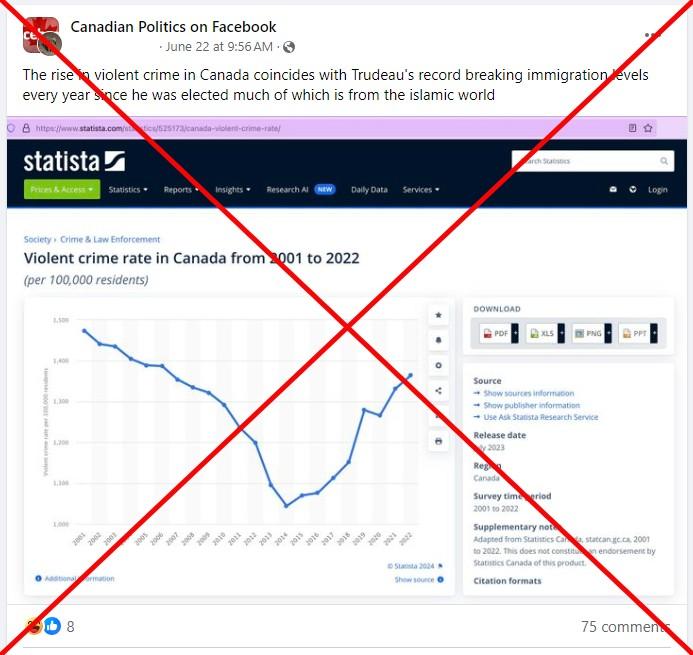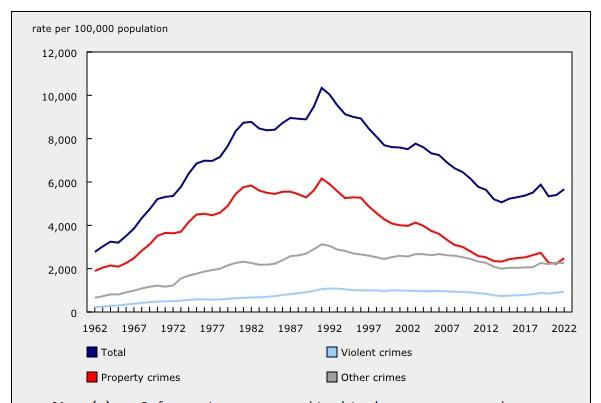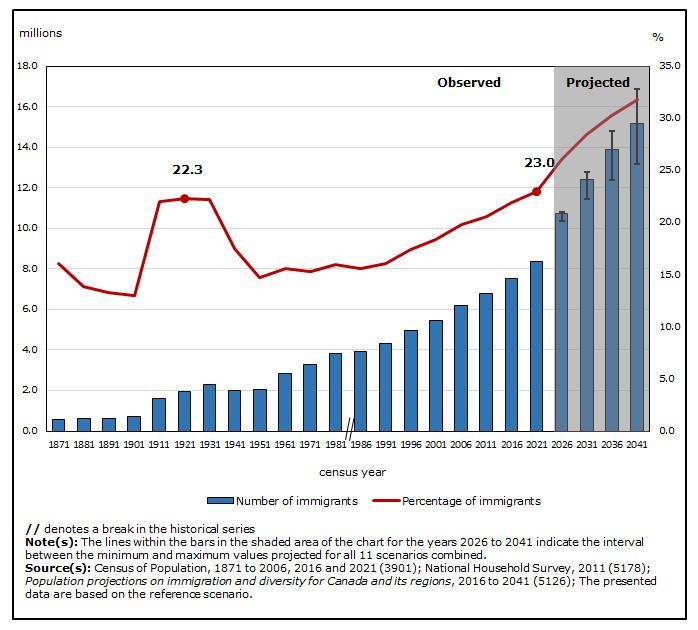
Posts linking crime to immigration in Canada are unfounded
- This article is more than one year old.
- Published on July 9, 2024 at 22:59
- 4 min read
- By Gwen Roley, AFP Canada
"The rise in violent crime in Canada coincides with Trudeau's record breaking immigration levels every year since he was elected much of which is from the islamic world," says a June 22, 2024 Facebook post.
The post includes a graph from the data-gathering site Statista that shows the violent crime rate in Canada fell between 2001 and 2014 before climbing again after 2015 -- the year Trudeau assumed office. The same graph has circulated in multiple Canadian Facebook groups.


The Liberal prime minister's term has been marked by a push to increase immigration, triggering debates about the availability of housing, food and jobs -- as well as misinformation.
The Statista chart cited in the posts roughly matches data on violent, police-reported crime from Statistics Canada (archived here and here). However, government data do not indicate a relationship with immigration, which has steadily risen since the 1950s (archived here).


"Anyone can find a correlation between any two things," said Frank Cormier, a criminologist at the University of Manitoba (archived here). "In-correlation most certainly does not always -- actually very rarely -- indicates causation."
He added that research shows "areas that have higher rates of immigration actually tend to see lower crime rates."
"So, there is absolutely zero evidence that links higher rates of immigration with higher rates of crime," he said July 4, 2024.
Examining crime, immigration
Researchers have for decades found an inverse relationship between immigration and crime in Canada.
A 2009 study from the University of Toronto found any trends towards youthful criminal activity among immigrants in the city decreased between two generations growing up in the 1970s and 1990s (archived here).
More recently, a 2020 paper from Toronto Metropolitan University examining crime rates between 1976 and 2011 also found the proportion of foreign-born residents was "either not significantly associated or negatively associated with changes in crime rates within Canadian cities" (archived here).
Cormier said one possible explanation is that immigrants must abide by the law to preserve their sometimes tenuous status within the country.
"Adults who are immigrants know that if they commit a crime that is serious enough, they face deportation," he said. "So, the average immigrant has far more to lose than the average non-immigrant in Canada."
Cormier said new arrivals also tend to place a higher emphasis on familial bonds and education, which generally lead people away from criminal activity.
Nicolas Ajzenman, an assistant professor in the economics department at McGill University (archived here), agreed that in Europe and the Americas, the effect of immigration on crime is practically non-existent.
However, he emphasized that immigrants are a heterogeneous demographic and that no trend applies globally.
"There are also a few papers documenting a positive effect, especially when the regulations to work legally are tougher," he said in a July 4, 2024 email, noting that some research has found evidence of increased property crime rates.
A 2013 study found this trend in the United Kingdom, for example (archived here).
But property crime is not the same as violent crime, the category mentioned in the social media posts -- and Ajzenman said immigrants who can fully integrate into local labor markets are usually associated with a reduction in delinquency.
Comparing crime statistics
Cormier said data alone do not paint a complete picture of crime, since they only measure incidents recorded by law enforcement.
"If police concentrate their efforts looking at certain types of crime or against certain parts of a city, then crime rates in those areas or on those certain crimes will tend to go up quite significantly," he said.
Cormier said the Statista graph shared online also shows a relatively small date range, implying that crime has jumped dramatically in the past 10 years.
However, more complete data from Statistics Canada indicate crime reports are still below the level seen in 1990s.
"We're still not anywhere close to where things were before," Cormier said.
Statistics Canada reported in 2018 that while there was not one single cause for decreasing crime near the end of the 20th century, the dip could be related to an aging population, changing police strategies and shifting attitudes toward illegal behavior (archived here).
Researchers and news reports say Canada's violent crime rate has risen since 2015 due to a combination of factors, including waning social safety nets -- especially following the Covid-19 pandemic -- over-reliance on police and firearms entering from the United States.
Read more of AFP's reporting on misinformation in Canada here.
Copyright © AFP 2017-2026. Any commercial use of this content requires a subscription. Click here to find out more.
Is there content that you would like AFP to fact-check? Get in touch.
Contact us
